We often wish to express that we are “easy to work with” on a resume, as it is a good aspect for any worker to possess. However, there are more applicable and appropriate terms that we could use to describe being “easy to work with”.
What Can I Say Instead Of “Easy To Work With” On My Resume?
Considering we utilize our resume as a means to getting a new position of employment, it is important to use the most formal and professional terminology that we can. Because of this, we are going to go over the following better terms for saying that we are “easy to work with”:
- Team Player
- Flexible
- Temperate
- Cooperative
- Personable
- Agreeable
- Disciplined
- Diligent
- Conscientious
- Attentive
The preferred version for the purposes of this article is a “team player”. This is because the term team player accurately represents what it means to be easy to work with and therefore, an excellent addition to any staff or workplace.
Team Player
When we think of a “team player”, we generally picture someone who is always willing to put in a good amount of effort to achieve a common goal. Cambridge Dictionary defines a “team player” as someone who is good at working with other people closely.
This means that to say we are a “team player”, is an excellent addition to any resume. It showcases or willingness to work with others and to constantly learn and improve.
Here are a few examples that showcase the use of this term:
- He is an excellent team player and always willing to go above and beyond for us.
- She was known around the office as being the ultimate team player. If you needed assistance on a task, she was the woman to ask.
- Our company requires a good team player to add to our marketing team.
Flexible
When we say that we are “flexible” employees, we are meaning to say that we are easily adaptive. Cambridge Dictionary defines “flexible” as being able to change or be changed easily according to the situation. This is considered a highly sought-after quality in employees.
When you are “flexible”, you are the type of person who can overcome any conditions or circumstances, keep a level head in the process.
We will now go over the following examples for this term:
- He is known to the managers as being flexible and always willing to pick up extra shifts when we are short-staffed.
- Her schedule is flexible, just ensure to give her a call-in advance so that she can get a babysitter for her daughter.
- Our company requires its employees to be incredibly flexible, working both day and night shifts. Is this something you are able to comply with?
Temperate
When we say that we are a “temperate” person or employee, we are meaning to say that we are aware of how to practice self-restraint or use moderation. Cambridge Dictionary defines “temperate” as behaviour that is considered calm and controlled.
Because of this, being a “temperate” employee is considered an asset. This is someone who is able to stay calm and grounded in any given situation, making them very easy to work with.
For additional information and clarity, here are a few examples using this term:
- She is a very temperate manager, which makes her very approachable to the entire staff.
- He was temperate in his abilities to smooth over any escalating situation, whether it be between customers or his coworkers.
- You both need to learn how to be more temperate and leave your problems at the door when you come to work.
Cooperative
To say that we are a “cooperative” employee means that we are willing to work with the staff to reach a common goal. This makes us very easy to work with and assistive. Cambridge Dictionary defines “cooperative” as being willing to help or do what people ask.
Therefore, to be a “cooperative” employee is an asset to any company or workplace, as this is someone who is agreeable and hard working.
We will now go over the following examples that use this specific term:
- I asked him to turn down the music behind the bar, as the customers were complaining and he is not being cooperative.
- He is very cooperative when it comes to trading shifts with other employees that require it.
- For this fundraiser to be successful, we must all be cooperative and work according to schedule.
Personable
Another great alternate term that we can choose to use is “personable”. When we say that we are “personable” employees, we mean to express that we always come to work in a good mood. Cambridge Dictionary defines “personable” as having a pleasant appearance and character.
Therefore, a “personable” worker is not only easy for their coworkers to work alongside, but they are also approachable and polite to any customers or guests.
Here are a few examples that we can go over for additional clarity over this term:
- She was very personable, which made hotel guests feel incredibly comfortable asking her questions.
- He was personable, which made him an excellent person to sit at the front desk, greeting anyone who entered the building.
- I am an intelligent, hard-working and personable employee, and I know I would be an excellent asset to your business.
Agreeable
When we say that we’re an “agreeable” person, we meant to express that we’re enjoyable person, that is willing to work to find solutions with anyone in need of it. Cambridge Dictionary defines an agreeable” person as someone pleasant or pleasing, or able to be accepted by everyone.
When we are “agreeable” employees we are often willing to take on tasks or help others that require them.
Some examples that highlight the use of this term are:
- These talks are aimed at finding a mutually agreeable solution between these two businesses.
- She is a very agreeable person, that is always able to take on extra tasks – showcasing how hard she works for this company.
- He is a cheerful and agreeable coworker, which has caused him to make many friends amongst the staff.
Disciplined
When we say that we are “disciplined” employees, we mean to express that we act in a very professional manner. Cambridge Dictionary defines “disciplined” as behaving in a very controlled way. Therefore, we are saying that we work in a focused and controlled manner.
Someone who is a “disciplined” employee is easy to trust and generally known for being very reliable.
The following examples showcase how you can appropriately use this term:
- He is a very disciplined worker, who I can always rely on to get the job done and in an impressively timely manner.
- His karate class is very well-disciplined, even the very young children.
- She has a very disciplined approach to management, much like her mother did before her.
Diligent
Someone who is “diligent” is considered a very easy employee to work with or rely on. Cambridge Dictionary defines “diligent” as being careful and using a lot of effort. This means that a “diligent” employee puts an immense amount of care and conscientiousness into their work on a daily basis.
Therefore, the term “diligent” is a superb option to use as a personal asset on your resume.
We can now look at the following examples, that use this term in an applicable way:
- She was a phenomenal student and now working as an incredibly diligent doctor – we couldn’t be prouder.
- Their lawyer is extremely diligent in preparing their upcoming case.
- He is a diligent forensic analysis and has solved many cases through his solo efforts.
Conscientious
We often consider a “conscientious” worker as someone who always wants to do the right thing. Cambridge Dictionary defines “conscientious” as putting a lot of effort into your work. Therefore, a “conscientious” employee is someone who is easy to rely on, as they do their work well.
Someone who is “conscientious” at work, is someone who puts forth an abundance of effort and completes it thoroughly.
Here are various examples that show the use of this term:
- She has become a very trustworthy and conscientious employee – someone we can all rely on.
- He is not only conscientious of his work but also the feelings and efforts of his fellow employees.
- We wanted to thank the management team for being so conscientious of the needs of the staff members!
Attentive
The last alternative that we will be going over is “attentive”. Cambridge Dictionary defines being “attentive” as listening carefully. An employee who is “attentive” is viewed as someone who pays close attention to detail, ensuring that tasks are completed correctly the first time.
At the same time, an employee who is “attentive”, often attends to the needs and feelings of their fellow workers or clients. This is considered a very polite and courteous employee, making being “attentive” a huge asset.
We will now go over the last examples for this article:
- She was consistently attentive to the needs of her coworkers, making sure that everyone had a great day and worked hard.
- He was a captivating motivational speaker, which caused his audiences to be attentive.
- The hotel was known for having a very pleasant atmosphere and incredibly attentive customer service.
What Does It Mean To Be “Easy To Work With”?
When we say that we are “easy to work with”, we can be expressing a multitude of qualities and attributes. We can be expressing that we are an employee that shows up on time, works incredibly hard, gets along well with anyone, and much more.
This is why we choose to use appropriate terms, as opposed to a broad statement like “easy to work with”. While this is still great quality, utilizing terms allows us to narrow down the specific attributes that we wish to acknowledge.
You may also like:
12 Good Synonyms For “Skills” On Your Resumé
11 Professional Synonyms For “Great Job”
Martin holds a Master’s degree in Finance and International Business. He has six years of experience in professional communication with clients, executives, and colleagues. Furthermore, he has teaching experience from Aarhus University. Martin has been featured as an expert in communication and teaching on Forbes and Shopify. Read more about Martin here.
I am trying to find a more succinct way of saying the phrase, «easy to work with». «Easy going» just sounds too lazy.
Added from comments:
«Team player» is cliché, however «flexible» is nice. I am in broadcasting, so it is a «hurry up and wait» kind of life. Or they may say, «I want it now, in a little while». One must stay positive when you rush to do something, and still have other things to take care of. Hence, «easy to work with» means you must keep cool and watch your mouth!
1006a
22.5k4 gold badges47 silver badges93 bronze badges
asked Jul 20, 2017 at 16:44
6
Flexible definitely fits here, and (cliché or not) so does team player. Eager to please might also fit, though it can carry connotations that may not be entirely appropriate; people-pleaser might be marginally better.
Your «problem», at base, is that the phrase easy to work with is ultimately very nebulous, and context-dependent. Instead of focussing on how to express this phrase, look at how to express the various aspects of being easy to work with, and express those in ways that are appropriate to the environment to which you are submitting the résumé.
answered Jul 20, 2017 at 17:07
Jeff ZeitlinJeff Zeitlin
6,6982 gold badges19 silver badges38 bronze badges
Cool-headed
Not easily worried or excited.
Temperate
Showing moderation or self-restraint.
Cooperative
Involving mutual assistance in working toward a common goal.
Willing to be of assistance.
answered Jul 20, 2017 at 17:53
1
Perhaps you could use ‘personable’. ‘Easy going’ might give the impression that you wouldn’t work very hard.
answered Jul 20, 2017 at 17:12
Скачать материал

Скачать материал


- Сейчас обучается 268 человек из 64 регионов






Описание презентации по отдельным слайдам:
-
1 слайд
Word Meaning
Lecture # 6
Grigoryeva M. -
2 слайд
Word Meaning
Approaches to word meaning
Meaning and Notion (понятие)
Types of word meaning
Types of morpheme meaning
Motivation
-
3 слайд
Each word has two aspects:
the outer aspect
( its sound form)
catthe inner aspect
(its meaning)
long-legged, fury animal with sharp teeth
and claws -
4 слайд
Sound and meaning do not always constitute a constant unit even in the same language
EX a temple
a part of a human head
a large church -
5 слайд
Semantics (Semasiology)
Is a branch of lexicology which studies the
meaning of words and word equivalents -
6 слайд
Approaches to Word Meaning
The Referential (analytical) approachThe Functional (contextual) approach
Operational (information-oriented) approach
-
7 слайд
The Referential (analytical) approach
formulates the essence of meaning by establishing the interdependence between words and things or concepts they denotedistinguishes between three components closely connected with meaning:
the sound-form of the linguistic sign,
the concept
the actual referent -
8 слайд
Basic Triangle
concept (thought, reference) – the thought of the object that singles out its essential features
referent – object denoted by the word, part of reality
sound-form (symbol, sign) – linguistic sign
concept – flowersound-form referent
[rәuz] -
9 слайд
In what way does meaning correlate with
each element of the triangle ?In what relation does meaning stand to
each of them? -
10 слайд
Meaning and Sound-form
are not identical
different
EX. dove — [dΛv] English sound-forms
[golub’] Russian BUT
[taube] German
the same meaning -
11 слайд
Meaning and Sound-form
nearly identical sound-forms have different meanings in different languages
EX. [kot] Russian – a male cat
[kot] English – a small bed for a childidentical sound-forms have different meanings (‘homonyms)
EX. knight [nait]
night [nait] -
12 слайд
Meaning and Sound-form
even considerable changes in sound-form do not affect the meaningEX Old English lufian [luvian] – love [l Λ v]
-
13 слайд
Meaning and Concept
concept is a category of human cognitionconcept is abstract and reflects the most common and typical features of different objects and phenomena in the world
meanings of words are different in different languages
-
14 слайд
Meaning and Concept
identical concepts may have different semantic structures in different languagesEX. concept “a building for human habitation” –
English Russian
HOUSE ДОМ+ in Russian ДОМ
“fixed residence of family or household”
In English HOME -
15 слайд
Meaning and Referent
one and the same object (referent) may be denoted by more than one word of a different meaning
cat
pussy
animal
tiger -
16 слайд
Meaning
is not identical with any of the three points of the triangle –
the sound form,
the concept
the referentBUT
is closely connected with them. -
17 слайд
Functional Approach
studies the functions of a word in speech
meaning of a word is studied through relations of it with other linguistic units
EX. to move (we move, move a chair)
movement (movement of smth, slow movement)The distriution ( the position of the word in relation to
others) of the verb to move and a noun movement is
different as they belong to different classes of words and
their meanings are different -
18 слайд
Operational approach
is centered on defining meaning through its role in
the process of communicationEX John came at 6
Beside the direct meaning the sentence may imply that:
He was late
He failed to keep his promise
He was punctual as usual
He came but he didn’t want toThe implication depends on the concrete situation
-
19 слайд
Lexical Meaning and Notion
Notion denotes the reflection in the mind of real objectsNotion is a unit of thinking
Lexical meaning is the realization of a notion by means of a definite language system
Word is a language unit -
20 слайд
Lexical Meaning and Notion
Notions are international especially with the nations of the same cultural levelMeanings are nationally limited
EX GO (E) —- ИДТИ(R)
“To move”
BUT !!!
To GO by bus (E)
ЕХАТЬ (R)EX Man -мужчина, человек
Она – хороший человек (R)
She is a good person (E) -
21 слайд
Types of Meaning
Types of meaninggrammatical
meaninglexico-grammatical
meaning
lexical meaning
denotational
connotational -
22 слайд
Grammatical Meaning
component of meaning recurrent in identical sets of individual forms of different wordsEX. girls, winters, toys, tables –
grammatical meaning of pluralityasked, thought, walked –
meaning of past tense -
23 слайд
Lexico-grammatical meaning
(part –of- speech meaning)
is revealed in the classification of lexical items into:
major word classes (N, V, Adj, Adv)
minor ones (artc, prep, conj)words of one lexico-grammatical class have the same paradigm
-
24 слайд
Lexical Meaning
is the meaning proper to the given linguistic unit in all its forms and distributionsEX . Go – goes — went
lexical meaning – process of movement -
25 слайд
PRACTICE
Group the words into 3 column according to the grammatical, lexical or part-of –speech meaning
Boy’s, nearest, at, beautiful,
think, man, drift, wrote,
tremendous, ship’s, the most beautiful,
table, near, for, went, friend’s,
handsome, thinking, boy,
nearer, thought, boys,
lamp, go, during. -
26 слайд
Grammatical
The case of nouns: boy’s, ship’s, friend’s
The degree of comparison of adj: nearest, the most beautiful
The tense of verbs: wrote, went, thoughtLexical
Think, thinking, thought
Went, go
Boy’s, boy, boys
Nearest, near, nearer
At, for, during (“time”)
Beautiful, the most beautifulPart-of-speech
Nouns—verbs—adj—-prep -
27 слайд
Aspects of Lexical meaning
The denotational aspectThe connotational aspect
The pragmatic aspect
-
28 слайд
Denotational Meaning
“denote” – to be a sign of, stand as a symbol for”establishes the correlation between the name and the object
makes communication possibleEX booklet
“a small thin book that gives info about smth” -
29 слайд
PRACTICE
Explain denotational meaningA lion-hunter
To have a heart like a lion
To feel like a lion
To roar like a lion
To be thrown to the lions
The lion’s share
To put your head in lion’s mouth -
30 слайд
PRACTICE
A lion-hunter
A host that seeks out celebrities to impress guests
To have a heart like a lion
To have great courage
To feel like a lion
To be in the best of health
To roar like a lion
To shout very loudly
To be thrown to the lions
To be criticized strongly or treated badly
The lion’s share
Much more than one’s share
To put your head in lion’s mouth -
31 слайд
Connotational Meaning
reflects the attitude of the speaker towards what he speaks about
it is optional – a word either has it or notConnotation gives additional information and includes:
The emotive charge EX Daddy (for father)
Intensity EX to adore (for to love)
Imagery EX to wade through a book
“ to walk with an effort” -
32 слайд
PRACTICE
Give possible interpretation of the sentencesShe failed to buy it and felt a strange pang.
Don’t be afraid of that woman! It’s just barking!
He got up from his chair moving slowly, like an old man.
The girl went to her father and pulled his sleeve.
He was longing to begin to be generous.
She was a woman with shiny red hands and work-swollen finger knuckles. -
33 слайд
PRACTICE
Give possible interpretation of the sentences
She failed to buy it and felt a strange pang.
(pain—dissatisfaction that makes her suffer)
Don’t be afraid of that woman! It’s just barking!
(make loud sharp sound—-the behavior that implies that the person is frightened)
He got up from his chair moving slowly, like an old man.
(to go at slow speed—was suffering or was ill)
The girl went to her father and pulled his sleeve.
(to move smth towards oneself— to try to attract smb’s attention)
He was longing to begin to be generous.
(to start doing— hadn’t been generous before)
She was a woman with shiny red hands and work-swollen finger knuckles.
(colour— a labourer involved into physical work ,constant contact with water) -
34 слайд
The pragmatic aspect of lexical meaning
the situation in which the word is uttered,
the social circumstances (formal, informal, etc.),
social relationships between the interlocutors (polite, rough, etc.),
the type and purpose of communication (poetic, official, etc.)EX horse (neutral)
steed (poetic)
nag (slang)
gee-gee (baby language) -
35 слайд
PRACTICE
State what image underline the meaningI heard what she said but it didn’t sink into my mind.
You should be ashamed of yourself, crawling to the director like that.
They seized on the idea.
Bill, chasing some skirt again?
I saw him dive into a small pub.
Why are you trying to pin the blame on me?
He only married her for her dough. -
36 слайд
PRACTICE
State what image underline the meaning
I heard what she said but it didn’t sink into my mind.
(to understand completely)
You should be ashamed of yourself, crawling to the director like that.
(to behave humbly in order to win favour)
They seized on the idea.
(to be eager to take and use)
Bill, chasing some skirt again?
(a girl)
I saw him dive into a small pub.
(to enter suddenly)
Why are you trying to pin the blame on me?
(to blame smb unfairly)
He only married her for her dough.
(money) -
37 слайд
Types of Morpheme Meaning
lexical
differential
functional
distributional -
38 слайд
Lexical Meaning in Morphemes
root-morphemes that are homonymous to words possess lexical meaning
EX. boy – boyhood – boyishaffixes have lexical meaning of a more generalized character
EX. –er “agent, doer of an action” -
39 слайд
Lexical Meaning in Morphemes
has denotational and connotational components
EX. –ly, -like, -ish –
denotational meaning of similiarity
womanly , womanishconnotational component –
-ly (positive evaluation), -ish (deragotary) женственный — женоподобный -
40 слайд
Differential Meaning
a semantic component that serves to distinguish one word from all others containing identical morphemesEX. cranberry, blackberry, gooseberry
-
41 слайд
Functional Meaning
found only in derivational affixes
a semantic component which serves to
refer the word to the certain part of speechEX. just, adj. – justice, n.
-
42 слайд
Distributional Meaning
the meaning of the order and the arrangement of morphemes making up the word
found in words containing more than one morpheme
different arrangement of the same morphemes would make the word meaningless
EX. sing- + -er =singer,
-er + sing- = ? -
43 слайд
Motivation
denotes the relationship between the phonetic or morphemic composition and structural pattern of the word on the one hand, and its meaning on the othercan be phonetical
morphological
semantic -
44 слайд
Phonetical Motivation
when there is a certain similarity between the sounds that make up the word and those produced by animals, objects, etc.EX. sizzle, boom, splash, cuckoo
-
45 слайд
Morphological Motivation
when there is a direct connection between the structure of a word and its meaning
EX. finger-ring – ring-finger,A direct connection between the lexical meaning of the component morphemes
EX think –rethink “thinking again” -
46 слайд
Semantic Motivation
based on co-existence of direct and figurative meanings of the same wordEX a watchdog –
”a dog kept for watching property”a watchdog –
“a watchful human guardian” (semantic motivation) -
-
48 слайд
Analyze the meaning of the words.
Define the type of motivation
a) morphologically motivated
b) semantically motivatedDriver
Leg
Horse
Wall
Hand-made
Careless
piggish -
49 слайд
Analyze the meaning of the words.
Define the type of motivation
a) morphologically motivated
b) semantically motivated
Driver
Someone who drives a vehicle
morphologically motivated
Leg
The part of a piece of furniture such as a table
semantically motivated
Horse
A piece of equipment shaped like a box, used in gymnastics
semantically motivated -
50 слайд
Wall
Emotions or behavior preventing people from feeling close
semantically motivated
Hand-made
Made by hand, not machine
morphologically motivated
Careless
Not taking enough care
morphologically motivated
Piggish
Selfish
semantically motivated -
51 слайд
I heard what she said but it didn’t sink in my mind
“do down to the bottom”
‘to be accepted by mind” semantic motivationWhy are you trying to pin the blame on me?
“fasten smth somewhere using a pin” –
”to blame smb” semantic motivationI was following the man when he dived into a pub.
“jump into deep water” –
”to enter into suddenly” semantic motivationYou should be ashamed of yourself, crawling to the director like that
“to move along on hands and knees close to the ground” –
“to behave very humbly in order to win favor” semantic motivation
Найдите материал к любому уроку, указав свой предмет (категорию), класс, учебник и тему:
6 210 150 материалов в базе
- Выберите категорию:
- Выберите учебник и тему
- Выберите класс:
-
Тип материала:
-
Все материалы
-
Статьи
-
Научные работы
-
Видеоуроки
-
Презентации
-
Конспекты
-
Тесты
-
Рабочие программы
-
Другие методич. материалы
-
Найти материалы
Другие материалы
- 22.10.2020
- 141
- 0
- 21.09.2020
- 530
- 1
- 18.09.2020
- 256
- 0
- 11.09.2020
- 191
- 1
- 21.08.2020
- 197
- 0
- 18.08.2020
- 123
- 0
- 03.07.2020
- 94
- 0
- 06.06.2020
- 73
- 0
Вам будут интересны эти курсы:
-
Курс повышения квалификации «Формирование компетенций межкультурной коммуникации в условиях реализации ФГОС»
-
Курс профессиональной переподготовки «Клиническая психология: теория и методика преподавания в образовательной организации»
-
Курс повышения квалификации «Введение в сетевые технологии»
-
Курс повышения квалификации «История и философия науки в условиях реализации ФГОС ВО»
-
Курс повышения квалификации «Основы построения коммуникаций в организации»
-
Курс повышения квалификации «Организация практики студентов в соответствии с требованиями ФГОС медицинских направлений подготовки»
-
Курс повышения квалификации «Правовое регулирование рекламной и PR-деятельности»
-
Курс повышения квалификации «Организация маркетинга в туризме»
-
Курс повышения квалификации «Источники финансов»
-
Курс профессиональной переподготовки «Техническая диагностика и контроль технического состояния автотранспортных средств»
-
Курс профессиональной переподготовки «Осуществление и координация продаж»
-
Курс профессиональной переподготовки «Технический контроль и техническая подготовка сварочного процесса»
-
Курс профессиональной переподготовки «Управление качеством»
- Top Definitions
- Synonyms
- Quiz
- Related Content
- More About Easy
- Examples
- British
- Idioms And Phrases
This shows grade level based on the word’s complexity.
This shows grade level based on the word’s complexity.
adjective, eas·i·er [ee-zee-er], /ˈi zi ər/, eas·i·est [ee-zee-ist]. /ˈi zi ɪst/.
not hard or difficult; requiring no great labor or effort:a book that is easy to read; an easy victory.
free from pain, discomfort, worry, or care: He led an easy life.
providing or conducive to ease or comfort; comfortable: an easy stance; an easy relationship.
fond of or given to ease; easygoing: an easy disposition.
not harsh or strict; lenient: an easy master.
not burdensome or oppressive: easy terms on a loan.
not difficult to influence or overcome; compliant: an easy prey; an easy mark.
free from formality, constraint, or embarrassment: He has an easy manner.
effortlessly clear and fluent: an easy style of writing.
readily comprehended or mastered: an easy language to learn.
not tight or constricting: an easy fit.
not forced or hurried; moderate: an easy pace.
not steep; gradual: an easy flight of stairs.
Commerce.
- (of a commodity) not difficult to obtain; in plentiful supply and often weak in price.
- (of the market) not characterized by eager demand.
Nautical.
- (of a bilge) formed in a long curve so as to make a gradual transition between the bottom and sides of a vessel; slack.
- (of the run of a hull) having gently curved surfaces leading from the middle body to the stern; not abrupt.
adverb
Informal. in an easy manner; comfortably: to go easy; take it easy.
noun
a word formerly used in communications to represent the letter E.
VIDEO FOR EASY
Why Is The «Easy Way Out» A Bad Thing?
At school or at work or in a competition especially, if someone is taking the easy way out then it’s like they’re being lazy or they’re doing something wrong. Do we get more credit for doing something the hard way than we would the easy way?
MORE VIDEOS FROM DICTIONARY.COM
QUIZ
CAN YOU ANSWER THESE COMMON GRAMMAR DEBATES?
There are grammar debates that never die; and the ones highlighted in the questions in this quiz are sure to rile everyone up once again. Do you know how to answer the questions that cause some of the greatest grammar debates?
Which sentence is correct?
Origin of easy
First recorded in 1150–1200; Middle English aisie, esy, from Anglo-French (a)eisie, Old French aisié, aised, past participle of aisier to ease
OTHER WORDS FROM easy
eas·y·like, adjectiveo·ver·eas·y, adjective
Words nearby easy
eastward, eastwardly, eastwards, East-West, Eastwood, easy, easy as pie, easy-breezy, easy-care, easy chair, easy come, easy go
Dictionary.com Unabridged
Based on the Random House Unabridged Dictionary, © Random House, Inc. 2023
MORE ABOUT EASY
What is a basic definition of easy?
Easy describes something that is not difficult and requires little effort. Easy also describes something that is not stressful. Informally, easy means in a comfortable way. Easy has many other senses as an adjective and one as a noun.
The most common sense of easy describes something that is simple and requires very little effort or work. This sense is an antonym of words such as difficult, challenging, or tough. Easily means in a way without difficulty. The word ease can mean a lack of stress or difficulty.
Real-life examples: Many things you might find easy to do were once hard until you learned to do them. Counting to five is easy once you learn to count. Finding the yellow crayon among all the blue crayons is easy once you know your colors. You no longer have to think about how to do these tasks. They are easy for you now.
Used in a sentence: She thought the math test was really easy.
Easy also describes something that lacks stress or any other sources of discomfort. This sense usually describes a person’s life as being relaxing or free from any problems or worries.
Real-life examples: Pampered pets often lead easy lives of sleeping and eating. When you’re on vacation, life often seems relaxing and easy.
Used in a sentence: He had an easy time at work today because nobody came into the store.
Easy is used informally to mean comfortably or without much stress or hardship. In formal writing, easily is preferred.
Real-life examples: Teachers will often go easy on students they like, meaning they won’t punish those students as harshly or will make things easier for them. If you are taking it easy, you are lounging around and not trying to work hard. If something comes easy to someone, it means they don’t need much effort to master it or complete it.
Used in a sentence: The manager went easy on the new employee, giving them a gentle warning.
Where does easy come from?
The first records of easy come from around 1150. It ultimately comes from the Old French aisier, meaning “to ease.”
Did you know … ?
How is easy used in real life?
Easy is a common word that is most often used to describe something that doesn’t take much effort or work to do.
I know it’s a really easy thing to do, but I installed a new 2TB SSD into my computer and I’m proud that it recognizes it AND I didn’t mess anything up xD
— Sarah_Nova✫ (@NovaDecoda) November 22, 2020
My cat lives such an easy life, all she does is eat and sleep 🛌
— Abbey💫 (@abbeyyapril) November 20, 2020
Day one training a new hire. I’m not sure how I feel about this new person lol. I went easy on him but next week I’m cracking the whip!!!
— Paul (@PaulKovaleski) May 13, 2020
Try using easy!
Is easy used correctly in the following sentence?
It was so easy for the professional chef to bake a small cake that she barely had to try.
Words related to easy
accessible, clear, effortless, obvious, painless, simple, smooth, straightforward, uncomplicated, comfortable, peaceful, pleasant, quiet, secure, slow, soft, successful, flexible, natural, apparent
How to use easy in a sentence
-
According to Mnuchin, a standalone PPP bill would be the “easiest” way to resume helping businesses.
-
Also, the side handles and lid make carrying it much easier.
-
Second, clinicians and patients should have easy access to that information, including amounts and potential adverse effects.
-
It has fewer options than Zoom, which makes it easier for kids to operate, but it’s even easier to use with these handy shortcuts.
-
Once home values begin a one-way plummet, it’s easy for economists to see how entire communities spin out of control.
-
Talking about death is never easy, but with food, comfort, and familiarity, a new kind of dinner party is making it easier.
-
The first thing they told us was that the traffickers are now using Turkish ports, which are relatively easy to reach from Syria.
-
You know, when I was younger, I used to make problems for myself, like it was too easy.
-
They selected an “easy mark” who turned out to be an off-duty NYC Housing Authority cop named James Carragher.
-
This will make it easy to pour the flour mixture into the stand mixer.
-
A constant sense of easy balance should be developed through poising exercises.
-
Big Reginald took their lives at pool, and pocketed their half-crowns in an easy genial way, which almost made losing a pleasure.
-
The first jolt had like to have shaken me out of my hammock, but afterwards the motion was easy enough.
-
His Indian repute had not preceded him to such degree as to make the way easy for him through the London crowd.
-
The endless miles of railways, the vast apparatus of the factories, the soaring structures of the cities bear easy witness to it.
British Dictionary definitions for easy
adjective easier or easiest
not requiring much labour or effort; not difficult; simplean easy job
free from pain, care, or anxietyeasy in one’s mind
not harsh or restricting; lenienteasy laws
tolerant and undemanding; easy-goingan easy disposition
readily influenced or persuaded; pliantshe was an easy victim of his wiles
not tight or constricting; loosean easy fit
not strained or extreme; moderate; gentlean easy pace; an easy ascent
economics
- readily obtainable
- (of a market) characterized by low demand or excess supply with prices tending to fallCompare tight (def. 10)
informal ready to fall in with any suggestion made; not predisposedhe is easy about what to do
slang sexually available
easy on the eye informal pleasant to look at; attractive, esp sexually
woman of easy virtue a sexually available woman, esp a prostitute
adverb
informal in an easy or relaxed manner
easy does it informal go slowly and carefully; be careful
go easy on
- to use in moderation
- to treat leniently
stand easy military a command to soldiers standing at ease that they may relax further
take it easy
- to avoid stress or undue hurry
- to remain calm; not become agitated or angry
verb easies, easying or easied
Also: easy-oar (usually imperative) to stop rowing
Word Origin for easy
C12: from Old French aisié, past participle of aisier to relieve, ease
usage for easy
Easy is not used as an adverb by careful speakers and writers except in certain set phrases: to take it easy; easy does it. Where a fixed expression is not involved, the usual adverbial form of easily is preferred: this polish goes on more easily (not easier) than the other
Collins English Dictionary — Complete & Unabridged 2012 Digital Edition
© William Collins Sons & Co. Ltd. 1979, 1986 © HarperCollins
Publishers 1998, 2000, 2003, 2005, 2006, 2007, 2009, 2012
Other Idioms and Phrases with easy
In addition to the idioms beginning with easy
- easy as pie
- easy come, easy go
- easy does it
- easy money
- easy on the eyes
- easy sledding
- easy street, on
also see:
- breathe easy
- free and easy
- get off (easy)
- go easy
- let someone down easy
- on easy street
- take it easy
The American Heritage® Idioms Dictionary
Copyright © 2002, 2001, 1995 by Houghton Mifflin Harcourt Publishing Company. Published by Houghton Mifflin Harcourt Publishing Company.
- Размер: 250 Кб
- Количество слайдов: 17
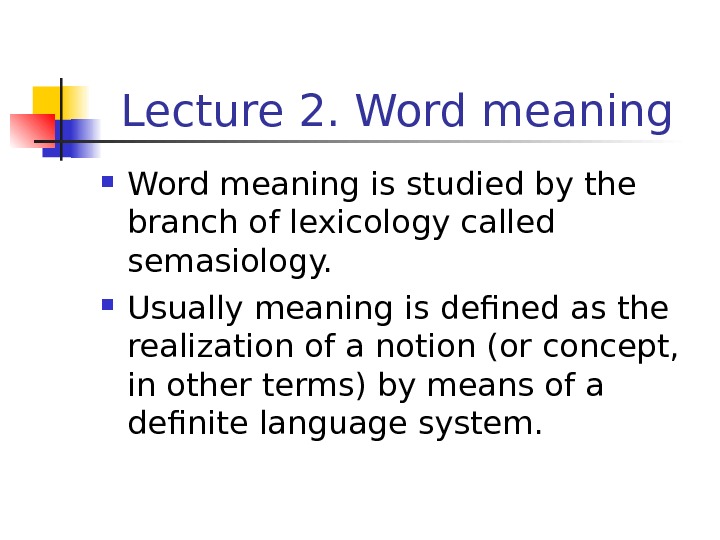
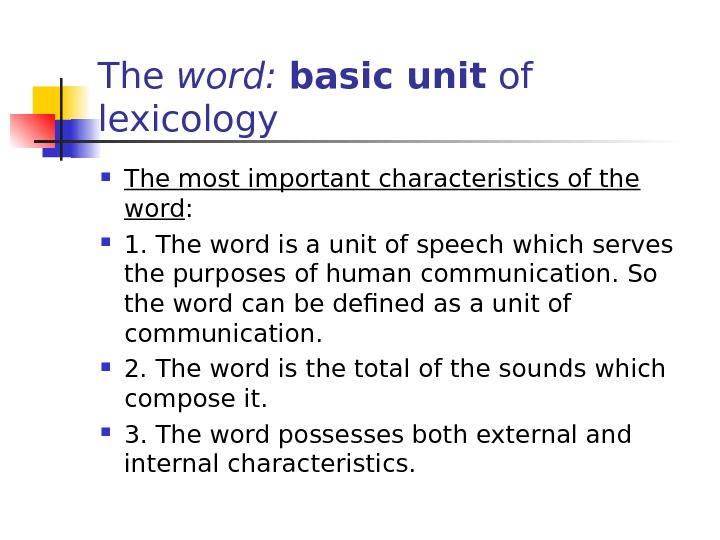
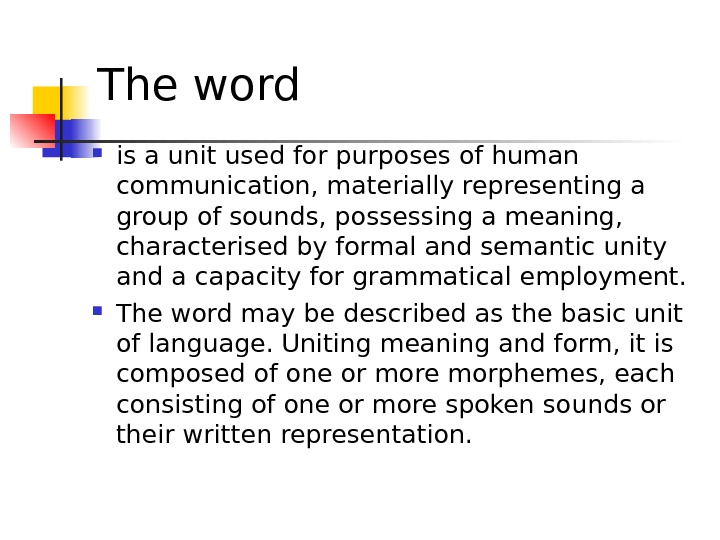
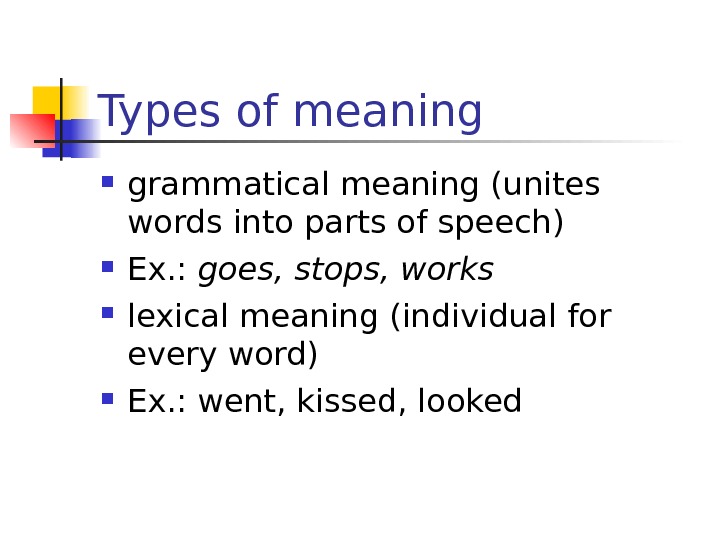
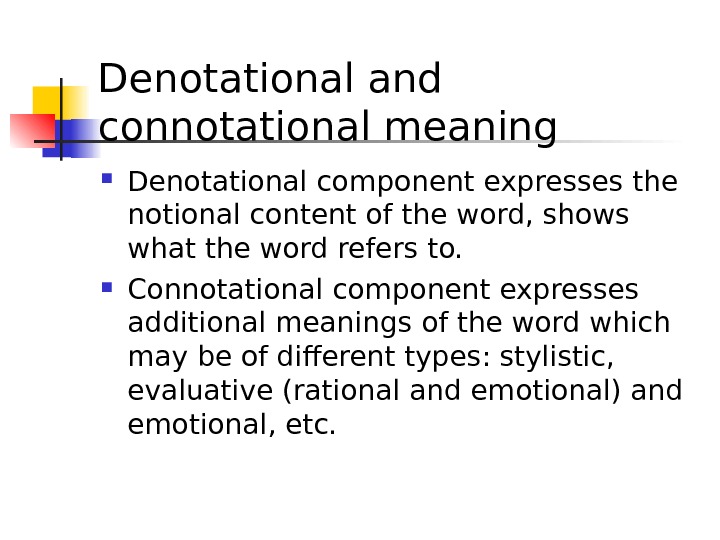


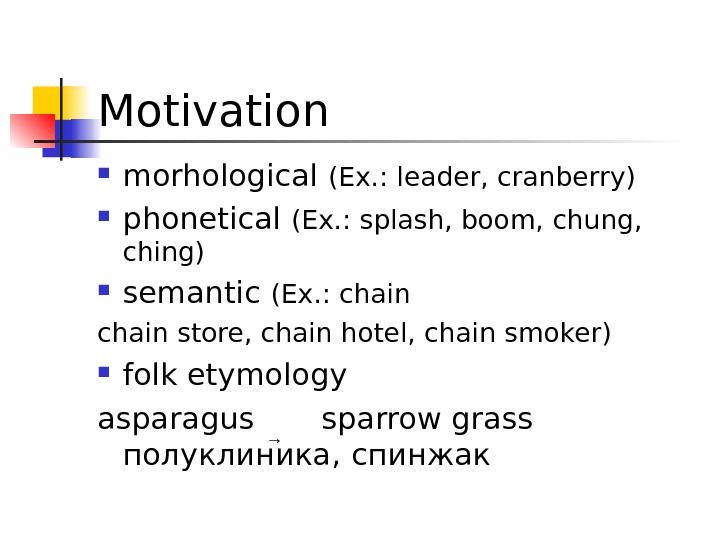

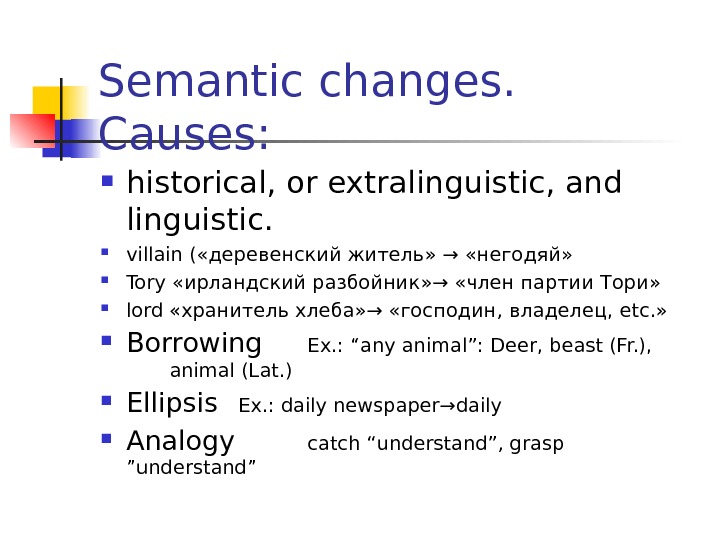
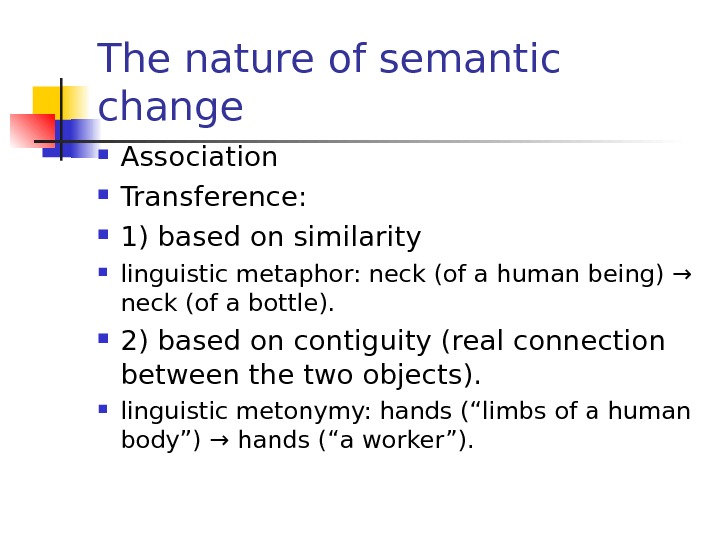
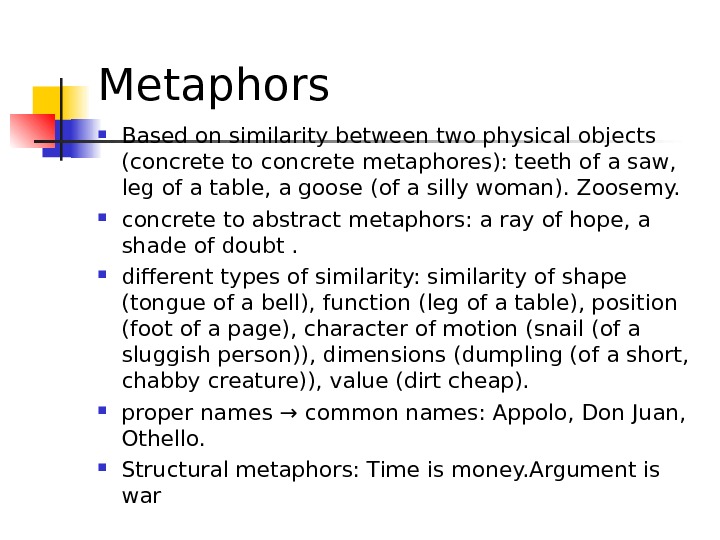



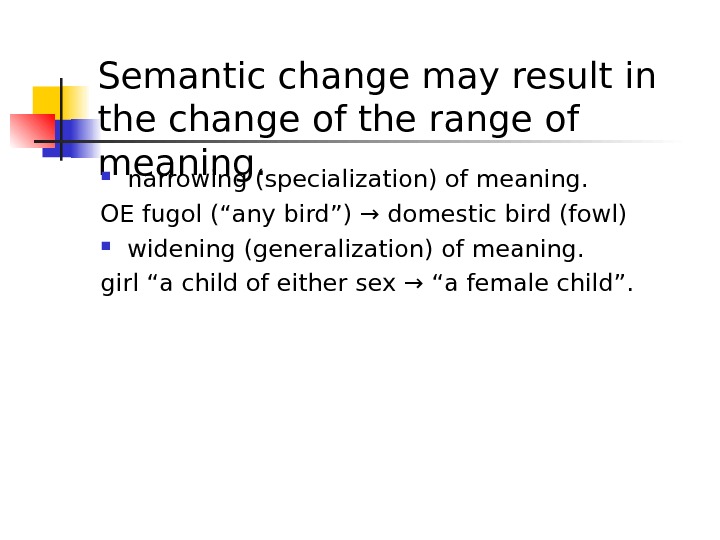
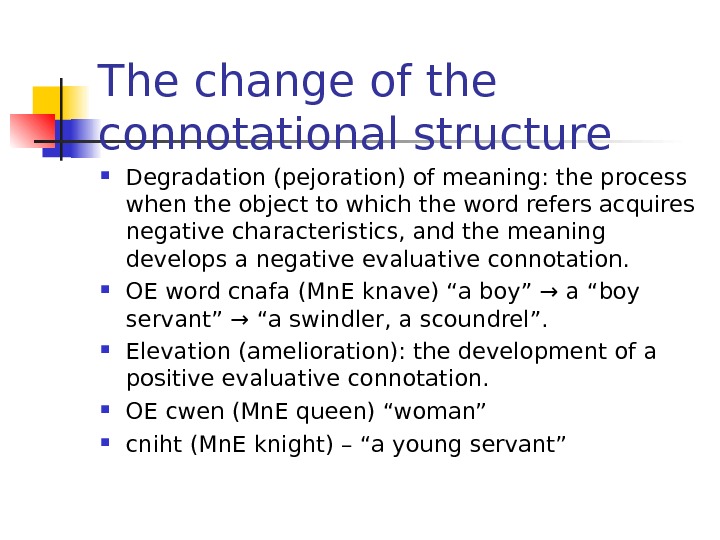











![Meaning and Sound-formare not identical
different
EX. dove - [dΛv]... Meaning and Sound-formare not identical
different
EX. dove - [dΛv]...](https://documents.infourok.ru/2d0c9b9d-1c12-4da2-8c1e-80496902c301/slide_10.jpg)









































